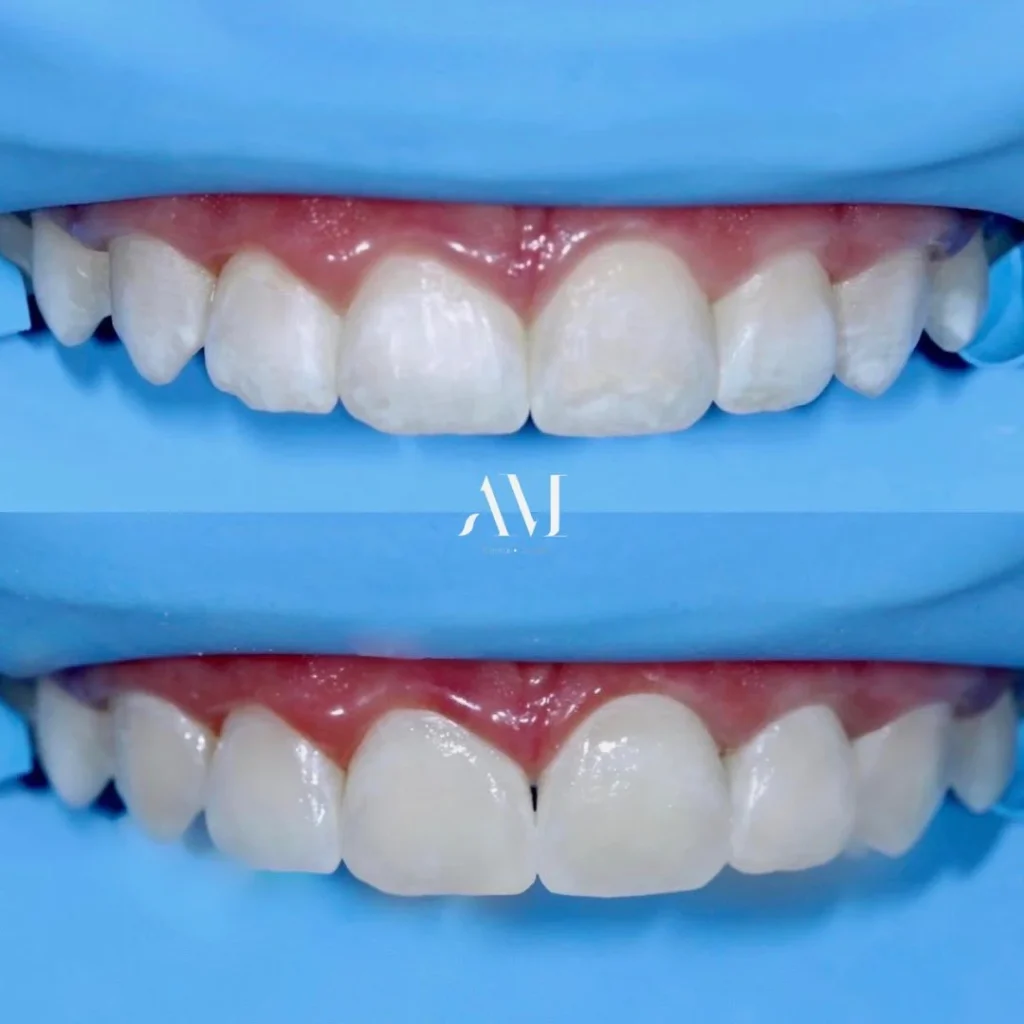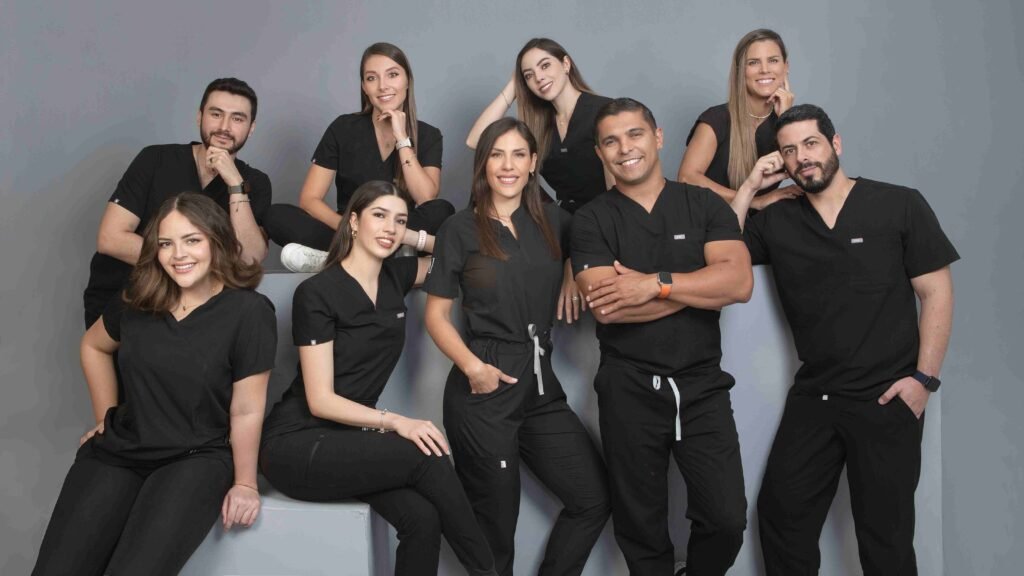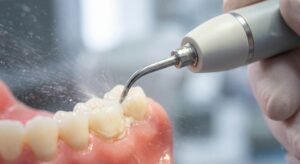When we talk about teeth whitening, most people think of a picture-perfect, commercial smile. That flawless, almost fluorescent whiteness many chase as if it were the new standard of oral health. But let’s be clear: not everything that’s white is healthy, and not everything that shines is gold.
Teeth whitening is one of the most popular cosmetic treatments today— and also one of the most misunderstood. There are myths, false expectations, risky trends, and above all, a huge lack of real information. Not the kind you get from the influencer of the moment, but the kind only someone who’s seen the good, the bad, and the unnecessary from the dental chair can give you.
Today we’re going to bust some myths and tell you the truths almost nobody shares about teeth whitening. The ones that actually matter. The ones you should know before making a decision that goes beyond just the color of your teeth.
What is teeth whitening really?

Before we get into the myths, let’s start with the basics. Teeth whitening is a procedure that lightens your natural tooth color by several shades, removing internal or surface stains.
But here’s the thing: not all whitening treatments are the same, nor do they work the same way. There are in-office procedures, at-home kits, combined treatments, with different concentrations and formulas. There isn’t just one type of whitening. What does exist, however, is a whole lot of misinformation.
And here’s the first uncomfortable truth: whitening doesn’t change your base color, it only lightens it. In other words, if your teeth are naturally yellowish, don’t expect a “Hollywood white.” The result is personal, and it depends on your biology, your habits, and the type of stain.
Are all teeth whitening treatments painful?

One of the big fears. Many patients ask: “Is it going to hurt me?” And the answer is… it depends.
As Dr. Alejandra Mora explains:
“Are all teeth whitening treatments painful? Do they cause sensitivity? Yes, but the intensity depends on the patient’s threshold.”
Dental sensitivity is the most common side effect. But it’s not actual pain. It’s more like a discomfort: that little “electric jolt” you feel when drinking something hot or cold. In most cases, it’s temporary and completely reversible.
The products used by professionals are designed to minimize that effect. Plus, a dentist will know how to adjust the dose and duration of the treatment according to your case. Because we don’t all react the same way, and that’s the key.
Do they cause sensitivity? Sensitivity that is temporary?

Yes. And this is another truth that nobody should hide.
Sensitivity occurs because the whitening agent penetrates the enamel and reaches the dentinal tubules. This generates a transient response— not dangerous, but uncomfortable for some people.
The important thing to know is that:
- It’s temporary
- It does not indicate permanent damage
- It can be prevented with desensitizing products used before or after treatment
Don’t let that fear stop you. But don’t downplay it either if it shows up. Always inform your dentist and follow the recommendations exactly.
Does teeth whitening affect existing restorations?
Yes, and this is something almost nobody explains before starting.
Fillings, crowns, veneers, or any other restorative material do not whiten. The whitening agent only works on natural teeth. What does this mean? If you have a visible restored tooth, after treatment it may look darker than the rest.
This doesn’t mean the whitening was done poorly. It means the treatment must be personalized and well planned, taking into account whether any restoration will need to be replaced afterward. That’s why a prior diagnosis is essential.
Is it safe to do teeth whitening at home?

Here comes a big warning.
There are “home” products sold online, in pharmacies, or on social media that promise miraculous results. Some work. Many don’t. But most importantly: none are safe if they’re not adapted to your specific case.
As Dr. Alejandra Mora explains:
Some home treatments, due to prolonged exposure, give better results. But that same prolonged time can also cause more sensitivity.
And in many cases, the effects aren’t just annoying. They can be dangerous. Gum burns, inflammation, enamel loss, irreversible damage to soft tissues. All of that is more common than you’d think when someone “whitens at home” with unregulated products.
Don’t put your mouth in the hands of an e-commerce algorithm. Health isn’t a trend.
How long do teeth whitening effects last?
It depends on many factors:
- Your daily oral hygiene
- Whether you smoke or not
- Your consumption of coffee, red wine, tea, etc.
- The type of whitening treatment you had
On average, professional whitening can last between 1 and 3 years, but always with maintenance. Nobody whitens once in their lifetime and that’s it. You have to take care of the results.
A good cleaning every six months, avoiding frequent staining agents, and using the right toothpaste can extend the effect without having to repeat the procedure constantly.
Does teeth whitening weaken teeth?
If done properly, no.
The problem comes when it’s overused, when it’s repeated without guidance, when it’s done with harsh products without supervision.
A professional treatment takes enamel integrity into account. It doesn’t weaken it. It doesn’t wear it down. It doesn’t fracture it. But if you do it without supervision, that’s a different story. There are real cases of severe erosion caused by poorly performed whitening. That’s why we emphasize so much: do it with your dentist, not with your favorite influencer.
What precautions should be taken before and after treatment?
Before whitening:
- Make sure you don’t have cavities or active sensitivity
- Get a professional dental cleaning
- Use desensitizing toothpaste if your dentist recommends it
After whitening:
- Avoid staining foods for 48 hours
- Don’t smoke (if you can quit entirely, even better)
- Don’t eat very hot or very cold foods if you feel sensitivity
- Use maintenance products recommended by your dentist
And above all, listen to your body. If something feels more uncomfortable than usual, tell your specialist.
Conclusion: Truths about teeth whitening
Teeth whitening is safe, effective, and aesthetically powerful when done correctly. But like all things in health, it’s not magic, and it’s not the same for everyone.
Yes, it can cause sensitivity.
Yes, it can affect your restorations.
Sí, hay productos caseros que pueden ser riesgosos.
But it’s also true that:
- It greatly boosts your confidence
- It rejuvenates your smile
- It’s an affordable, fast treatment with a big visual impact
- And most importantly: it’s reversible and controllable when done by professionals
It’s not about having the whitest smile in the group. It’s about having a healthy, real, and truly yours smile. And if it can look better, great. But never at the expense of your health.
Do you have doubts about whether whitening is right for you? Have you already tried one and aren’t sure if it worked well?

Best Choice
At AM Dental Studio in Zapopan, Guadalajara, we keep it real. We tell you the truth, evaluate your case, and if you really need it, we’ll give you the best treatment for you. No empty promises, no hidden dangers.
📍 Estamos en Zapopan, Guadalajara
🌐 Conócenos más en: amdentalstudiogdl.mx





